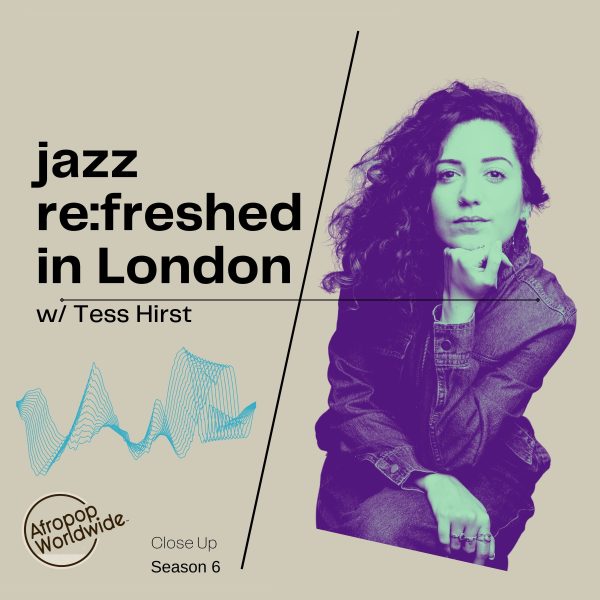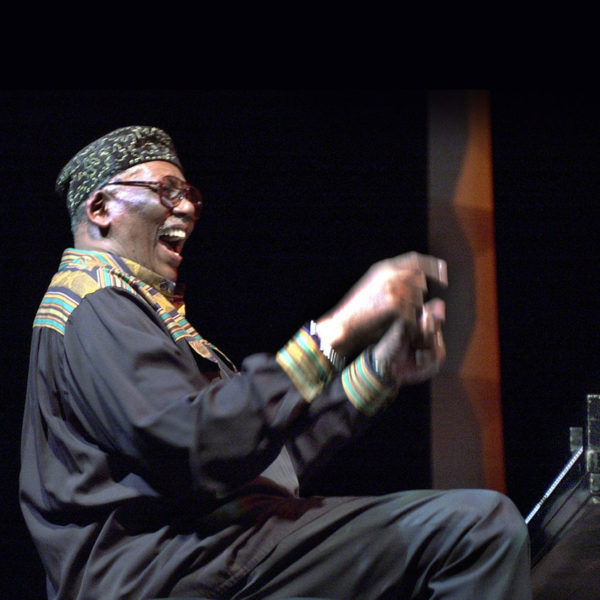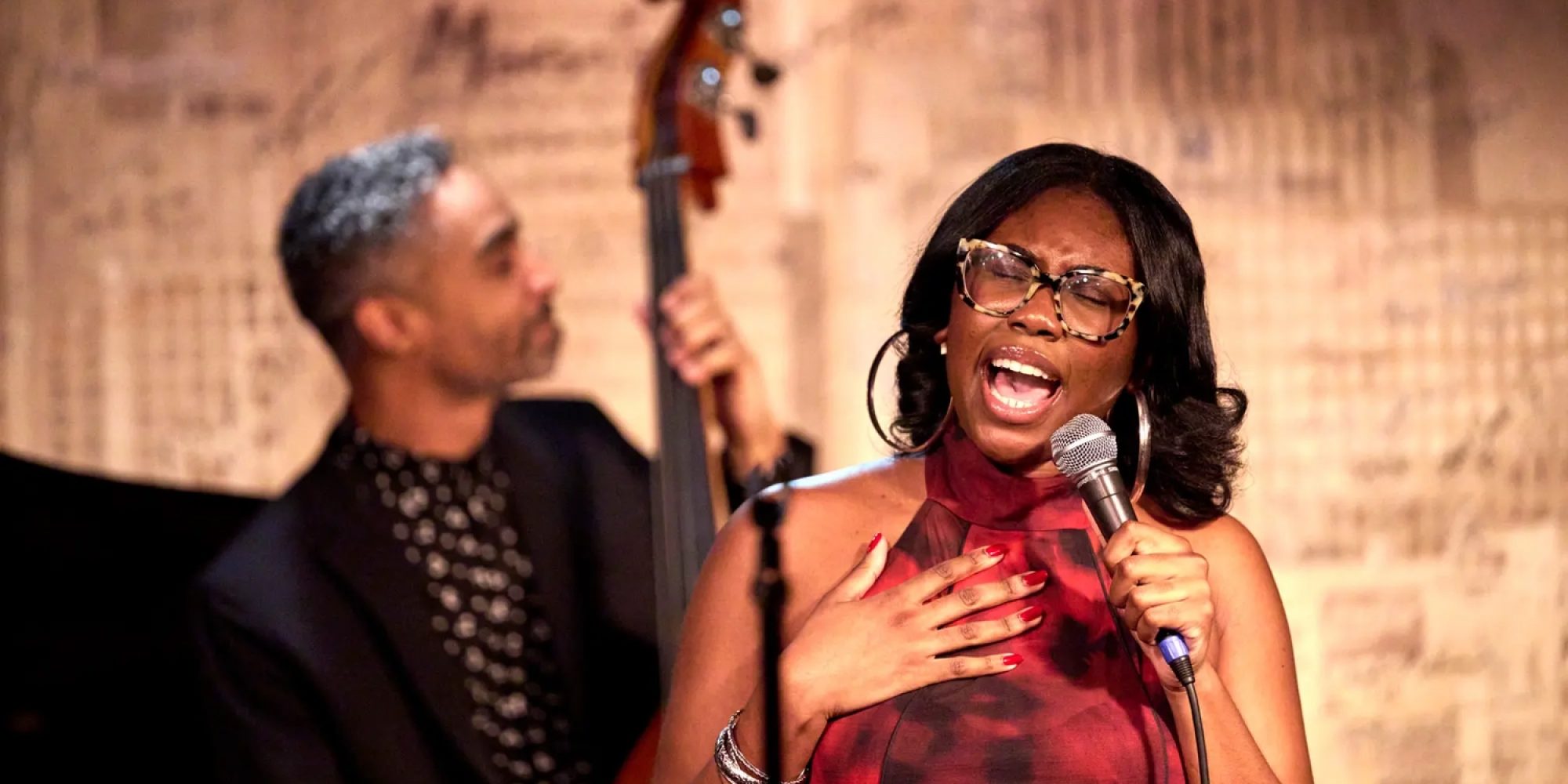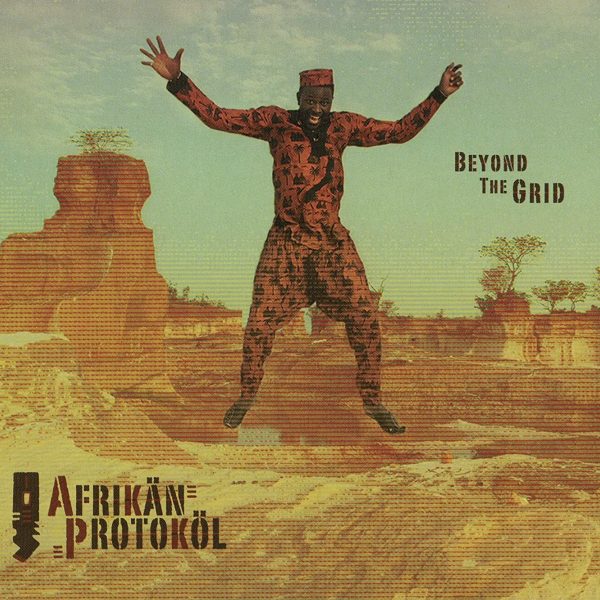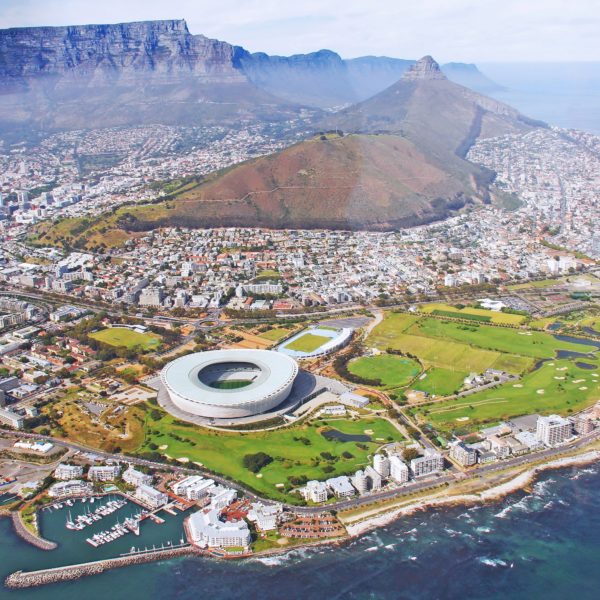One of the most memorable moments for us this year at the Festival International de Jazz de Montreal was the chance to see and hear 25-year old, Cameroonian-American jazz singer Ekep Nkwelle. Over the last couple of years, Nkwelle has been lauded as one of the rising stars in the jazz world. Born and raised in Washington, D.C., she graduated from the Duke Ellington High School of the Arts which led her to Howard University where she studied under – and quickly found herself on stage and recording with – acclaimed pianist Cyrus Chestnut. Soon thereafter, she was awarded the prestigious Julliard Career Advancement Grant by Wynton Marsalis, was First Runner-Up in The Sarah Vaughan International Jazz Voice Competition, and appeared on an NPR’s Tiny Desk Concert. She has performed at New York's Radio City Music Hall and Lincoln Center, as well as the Kennedy Center in her home town, and has been backed on stage by artists ranging from virtuoso classical pianist Lang Lang to Grammy-winning jazz guitarist Russell Malone. And just to reiterate the fact, Nkwelle is all of 25 years of age.
We were honored to have a chance to sit down and have a conversation with Nkwelle between sets at the outdoor Pub Molson stage.
Ron Deutsch: I want to say right away that it's just crazy you are only 25 years old. You've been studying music since you were like a pre-teen, but still, already, you have this amazing resumé and the respect of so many in the jazz establishment? Do you wake up in the morning thinking you’re in some dream?
Ekep Nkwelle: [Laughing] So I was always singing – but this is not a story that I tell very often –at a very young age, I had a family member say that: “You're not gonna be a singer.” It just wasn't something that they took very seriously. In my culture, I'm Cameroonian, so in my culture – and in a lot of West African cultures – it is seen as more of a hobby to sing rather than something that you can actually make a career of. So, being born in America, being a singer to me is something that's accessible, but having parents and aunties and uncles who were born in Cameroon, to them, that's just something that they have seen people try at and fail. And so, that's where it came from. It wasn't malicious at all. It was just that his response was a product of his experience.
And it wasn't even like you cannot sing, as in: “Don't sing around the house.” It was like: “Get it out of your head that you're gonna be a professional singer. Get out of your head that you're gonna be Whitney Houston. There's only one Whitney Houston.” But Whitney Houston became Whitney Houston, you know? So it's just like you become who you are meant to become when people around you give you that kind of platform to be able to spread your wings. So that deterred me from singing for awhile.
But this relative who said that, did it have to do you with being a woman or was this for anyone?
Anyone in general. Yep, anyone. I still came from a family where my father – he used to sing – he's actually on an album – but I won't get too much into that. He actually recorded an album with a very well-known Cameroonian artist, Prince Eyango, who was like an uncle to me. So my dad sang, he played log drum [also known as the slit drum], and so music was a part of my household, but it just wasn't something to be seen as a career. But my mother and father put us in a school, the Duke Ellington School of the Arts, where playing an instrument was mandatory. And so while my singing was a little bit muted, I was still playing an instrument.
I was playing tenor saxophone. All the girls were playing flute and clarinet, and I wanted to play flute and clarinet, but the teacher was like: "Look at your hands. You need to play a tenor saxophone." And I was like: "Man!?" To this day, I still have a very unique love and bias for tenor sax players, for sure. [Laughs]
Then one day, I read, some teacher said you should sing. Is that the story?
Yup. It's actually like my life is just this big whirlwind of these events that kind of intertwine and all inform each other. But like the blossoming of these seeds that are planted, they happen during different seasons. And so much was thanks to my mom.
So what led you to jazz music?
Originally, I wanted to sing neo-soul and r&b. I used to listen to Beyoncé, Keri Hilson, Keyshia Cole – all these hip-hop/r&b names, especially in the early 2000's.
And then in the summer of 2015 or 2016 – that was the transition between my sophomore year and my junior year – we were doing a celebration for Duke Ellington's birthday. I was in the show choir at that time, but the jazz orchestra at the school was performing. And they were playing "Sophisticated Lady." We were sitting in the audience, waiting for our turn to go up and perform. I was listening – and I lie to you not – it was like time stopped. It was one of those “aha!” moments, an epiphany, like, "Oh, this is what I'm supposed to be doing." Not too many people get those kinds of experiences, or even are ready and open to receive that kind of experience when it comes. Sometimes it passes us by. And in that moment, I believe I was ready to receive it, because though I loved this show choir that I was in, I felt a calling towards something else.
And also when I listened to Sarah Vaughn sing "September in the Rain" on the Live at Mr. Kelly's album. And that just stirred something in my spirit, but I didn't know what it was exactly. And when I sat down in that audience and heard that orchestra play “Sophisticated Lady,” I not only said: “This is what I want to do,” I said: “That band needs a singer.” [Laughs]
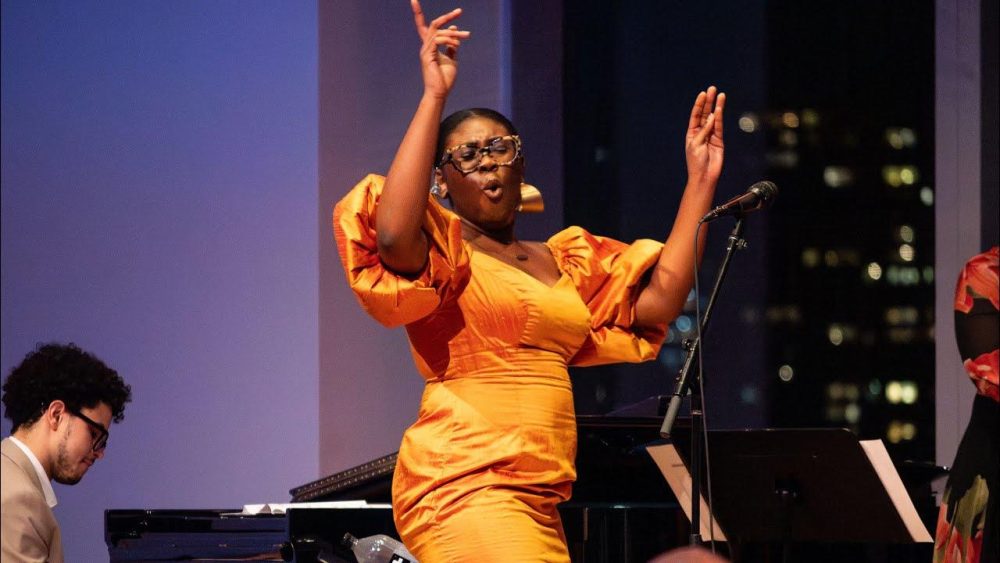
I'm wondering how all the African music you listened to growing up has influenced your singing.
Music in most – if not all – African cultures is really like a way of life. It's embedded in so many different cultural practices just within daily life. One specific thing I can say is growing up in the United States, when our parents – and I would say as well the Cameroonian parents of my cousins and my friends that are second-generation Cameroonians and first-generation Americans – came to the United States, they created our own little Cameroon here, like here in the D.C./Maryland/Virginia area. I feel like most Cameroonians when they come to United States they go right to Maryland. [Laughs] There was just this huge culture, a lifestyle of almost as if you were in Cameroon. You walk into somebody's home and we would have these things like Bakossi meetings.
My father is a part of the Bakossi tribe and during these meetings, before they start the meeting, there's a song that they sing. And during the meeting, there are songs they sing to invoke certain things – like maybe during a Thanksgiving meeting there's a song that they sing. So music is just embedded in our way of life. On Saturdays mornings, when we're doing devotion, there are songs that we sing. When we're in mourning, there are specific songs we sing. So it's just a part of our lifestyle.
And so having all of that growing up, it informed my realization that when I am making music – specifically jazz – I want it to also be spiritual, to be that a part of my personhood. I want to connect to each and every song that I'm singing, the way that my parents connect to these songs that they're singing to start a meeting, or when they're waking up, or even the way when we speak our language – as many people say – it sounds like we're singing when we're talking. And so, yeah, I think that informs the way that I approach my selection of music, from just that experience growing up.
And furthermore, my father not only listened to makossa or Fela Kuti, or Afrobeat during that time, he was also listening to Bob Marley and Jimmy Cliff. And the passion that they bring to their music, I really do hope that people were able to see that on stage when I performed. That informs almost every time I walk on that stage, not only is it my spiritual beliefs, but also me wanting people to see how passionate I am about this experience – spirit to spirit, person to person. You are here to find joy, maybe to cry, maybe to feel angry, and then release it at the end of the show with a laugh or with tears. I do not take that lightly. And so I want to treat each and every performance experience with that kind of intention, with that kind of spirituality, and with that kind of passion that I believe Bob Marley and Jimmy Cliff displayed during their time.
Last year, I spoke with the South African musician Nduduzo Makhathini here at the festival, and he spoke about a connection between African and American music. That there were musical cultural things lost due to colonization in Africa, but survived in the Americas through the slaves, and things lost by slavery that lived on in Africa. And now, these things are being reconnected. Have you felt this in your experience of the two cultures within you?
Just the connection to this music, seeing it as a spiritual source – especially as a vocalist – seeing this sound, this music is coming from my body. At a certain point, yes, there are people that can use their hands, but there is nothing more powerful than our voices. And that's something that existed in Africa and that's something that existed in America. That is something that is, honestly, universal. I hate to make it on like a macroscopic scale, but it is universal. In every culture you find that the voice, that a cappella sound that we make, has something very spiritually connected to it. Negro spirituals. It helps us get through, and it helps us persevere, and it even comforts us. Work songs, the songs of mourning, like there's a specific song of mourning we sing in Cameroon, "Yondo Celele." It's a song that says, "A good journey to this person that we love who is going on to the next life.” And we sing that – there are no chords, there's no music happening – just voices. And I mean, it gives you chills when you hear that song being sung the way it was sung originally.
And in terms of that intersection with jazz music, and my approach to that, it's like when you're talking about music from Nina Simone, especially towards the end of her career, or the end of her life, she was trying to access power. She was accessing power. She was accessing freedom, liberation. Trying to not only open the minds of her audiences, but her ownmind, as well. And I think that is that intersection for me – that power, that spirituality, that certainty of who I am, where I come from. And I believe artists such as not only Nina Simone, but Max Roach, Abby Lincoln, Betty Carter, or Oscar Brown Jr.. They are phenomenal lyricists, phenomenal composers, these are people who began to realize each and every one of these very important aspects of truthfully being a musician, being an artist. I think that is something that they achieved, or began to achieve, later on in their lives, that it would be in our best interests as young musicians to be. They've given us access to it at the beginning of our lives. So take it and run with it. Start where they left off. Don't start where they started. Start where they left off.
So, last question. From your 25 year-old perspective, a lot of people talk about there's no good music anymore. I don't agree, but I do think that the role of music has shifted over the last 25 years. Music seemed much more to play a more central role in people's lives. So how do you see music? The role of music? I mean overall – the importance of the music?
One thing I will say is that I've noticed a lot of sensationalism. That's been happening for a long time, probably even longer than I've existed, honestly. This idea that when somebody, or within our specific societies – I don't know, our community, our city, our state, country, whatever – really loves something, everybody starts running towards that sound – running towards being just like that person. And we lose other voices. We lose versatility in music, in sound, because everybody wants to go this way.
There's so many ways that pop music can sound, but we have all decided that there was one way that it should sound. And when it changes, nobody wants to stay where it was before. Everybody wants to run to the new thing. But we need people to stay where it was, and continue to feed that audience, and continue to grow that sound, and continue to dwell there. And then we also need people to move on to the next thing. And then when the next thing happens, we need people to stay at that thing that was once new and others can move to the newer thing.
But what we have is everybody runs towards this certain sound. We have so many people that want to sound like John Coltrane, and that's okay. And the people that sound like John Coltrane naturally – let that be that. But don't mirror your artistry. Don't mirror your music after him. We need to hear you. We need to know what you sound like. And so this idea of sensationalism, I feel affects the music, affects audiences. Everybody can't be playing free jazz. Everybody can't just be playing standards. Everybody can't just be doing one thing. We need so many more voices. To just boil it down to one thing – we need to hear you.
I say this not just to young artists, but also to artists who are in their “middle ages,” to artists who are our elders in the music – we need to hear your voice. I believe that that is what the world is missing. We are missing people's true and honest voices. And there are reasons for that. And it's bigger than just artists. It's the music business at large – I won't say too much about that – but what we need right now in the world is to hear the voice of real humans, of real individuals, of real people, of real artists across all lines – not just music – but with artists who use their hands to mold clay, to paint pictures, with dancers. We need to hear and see who you are. That's what we're missing.
This was great. What a pleasure. Thank you.
Thank you so much.
Related Audio Programs
